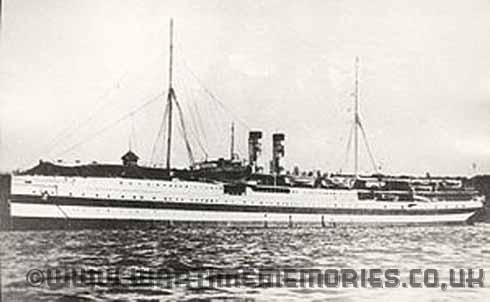30th March 1916 Russian Hospital Ship 
HS Portugal - Russian Hospital Ship in the Black Sea
Russian hospital ship Portugal (Russian: госпитальное судно "Португаль") was a steam ship originally built by a French shipping company, but requisitioned for use as a Russian hospital ship during the First World War. On the 30th March 1916 she was sunk by a torpedo from the German U-boat U-33.
History[edit]
She was originally built in 1886 for the Brazil and River Plate Line of the Messageries Maritimes Company. She was chartered or purchased by the Russians for use as a hospital ship in the Black Sea.
Sinking.
Georgian princess Aneta Andronnikova was one of the Red Cross nurses who died in the Portugal incident.
On the 30th March 1916, the Portugal was towing a string of small flat-bottomed boats to ferry wounded from the shore to the ship. Off Rizeh, on the Turkish coast of the Black Sea, she had stopped as one of the small boats was sinking and repairs were being made. The ship was not carrying wounded at the time, but had a staff of Red Cross physicians and nurses on board, as well as her usual crew.
The ship's crew saw a periscope approaching the vessel but as the ship was a hospital ship and protected by the Hague conventions no evasive actions were taken. Without warning the submarine fired a torpedo which missed. The U-boat, U-33, came around again fired a torpedo from a distance of 30 feet, which hit near the engine room, breaking the ship into two pieces.
The Vperiod.
On the 8th July 1916, another Russian hospital ship, named Vperiod (Вперёд; also transcribed, French-style, as Vperiode) was sunk between Rizeh and Batum, allegedly by German U-boat U-38. The boat was not carrying wounded, as it was on its trip to the frontline. Seven people died, the rest were saved.
The Russian government claimed that Turkish forces sank the Portugal and the Vperiod. The Turkish government replied that both ships were sunk by mines.
Account of Sinking of SS Portugal.
The submarine approached the "Portugal" quietly
and discharged a torpedo, which missed its aim.
Then it circled round and discharged a second at
the other side of the vessel, from some 30 or 40 feet
away. This second torpedo struck the Portugal
amidships, in the engine-room. There was a violent
explosion; the hull broke in two, and most of those
on board were precipitated into the whirlpool between
the two halves. With a still more violent explosion
the boilers blew up, and the bow and stern
fragments of the "Portugal" went down simultaneously.
Forty-five of the Red Cross staff were lost, twenty-one
of whom were nurses. Twenty-one men were lost
out of the Russian crew, and nineteen out of the
French. Thus eighty-five of those on board perished
altogether.
Here is an account of the outrage by one of the
survivors—Nikolai Nikolaevitch Sabaev, secretary
to the Russian Red Cross Society's Third Ambulance
Detachment with the Army of the Caucasus:—
" At about 8 o'clock in the morning, somebody on board
shouted out, 'submarine boat.' At first, this news did
not produce any panic; on the contrary, everybody
rushed on deck to be the first to see the submarine. It
never entered anybody's head to suppose that a submarine
would attack a hospital ship, sailing under the flag of the
Red Cross. I went on to the upper deck, and noticed the
periscope of a submarine, moving parallel with the steamer
at a distance of about 170 or 200 feet. Having reached a
point opposite to the middle of the 'Portugal,' the periscope
disappeared for a short time, then reappeared, and
the submarine discharged a torpedo. I descended from
the upper deck, and ran to the stern, with the intention of
jumping into the sea. When, however, I noticed that most
of the people on deck had life-belts, I ran into saloon No.
5, seized a life-belt, and put it on, but then I fell down, as
the 'Portugal' was sinking at the place where she was
broken in two, while her stem and stern were going up
higher all the time. All round me unfortunate sisters of
mercy were screaming for help. They fell down, like myself,
and some of them fainted. The deck became more
down-sloping every minute, and I rolled off into the water
between the two halves of the sinking steamer. I was
drawn down deep into the whirlpool, and began to be
whirled round and thrown about in every direction.
While under the water, I heard a dull, rumbling noise,
which was evidently the bursting of the boilers, for it
threw me out of the vortex about a sazhen, or 7 feet, away
from the engulfment of the wreck. The stem and stern of
the steamer had gone up until they were almost at right
angles with the water, and the divided steamer was settling
down. At this moment I was again sucked under,
but I exerted myself afresh, and once more rose to the surface.
I then saw both portions of the 'Portugal' go down
rapidly, and disappear beneath the flood. A terrible commotion
of the water ensued, and I was dragged under, together
with the 'Portugal.' I felt that I was going down
deep, and for the first time I realized that I was drowning.
. . . My strength failed me, but I kept my mouth firmly
shut, and tried not to take in the water. I knew that the
moment of death from heart failure was near. It so happened,
however, that the disturbance of the water somewhat
abated, and I succeeded in swimming up again. I
glanced round. The ' Portugal ' was no more. Nothing
but broken pieces of wreck, boxes which had contained
our medicaments, materials for dressing wounds, and provisions
were floating about. Everywhere I could see the
heads and arms of people battling with the waves, and
their shrieks for help were frightful. . . . 8 or 9 sazhens
(56 or 63 feet) away from where I was, I saw a life-saving
raft, and I swam towards it. Although my soddened
clothes greatly impeded my movements, I nevertheless
reached the raft, and was taken on to it. About 20 persons
were on it already, exclusively men. Amongst them
was* the French mate, who assisted the captain of the
' Portugal, ' and he and I at once set about making a rudder
out of two of the oars which were on the raft, and we
placed an oarsman on each side of it. We had been going
about 8 minutes when we saw the body of a woman floating
motionless, and dressed in the garb of a sister of mercy.
. . . We then raised her on to the raft. She was unconscious,
quite blue, and with only feeble signs of life. . . .
She at last opened her eyes and enquired where she was.
I told her that she was saved. Soon, however, she turned
pale, said she was dying, and gave me the address of her
relatives, to inform them of her death. She began to spit
blood, and was delirious, but gradually a better feeling
returned, and she was soon out of danger. We went on
rowing towards the shore for a considerable time. . . .
At last a launch, towing a boat full of the rescued, took
us also in tow, and we reached the shore in safety. The
hospital ship 'Portugal' was painted white, with a red
border, all around. The funnels were white with red
crosses, and a Red Cross flag was on the mast. These
distinguishing signs were plainly visible and there can
be no doubt whatever that they could be perfectly well
seen, by the men in the submarine. The conduct of the
submarine itself proves that the men in it knew that
they had to do with a hospital ship. The fact of the submarine
having moved so slowly shows that the enemy was
conscious of being quite out of danger."
John Doran
8th July 1916 Russian Hospital Ship In the beginning of 1916 the "Vperiod," a vessel
of 858 tons, was transformed into a hospital ship,
with 120 beds for wounded, to take the place of
the "Portugal." On July 8th, 1916, while on her
way from Batoum to Rizeh, near Trebizond, to fetch
wounded, she was torpedoed without warning and
sank, with a loss of 7 lives. The "Vperiod" bore all
the usual Red Cross marks ; and the enemy Governments
had been duly informed of the vessel's new
status when the change was made six months earlier.
John Doran
If you can provide any additional information, please add it here.







